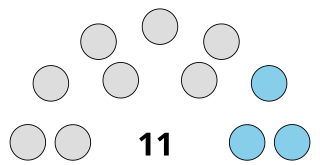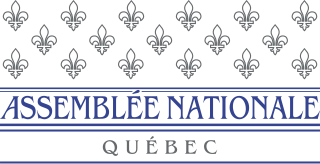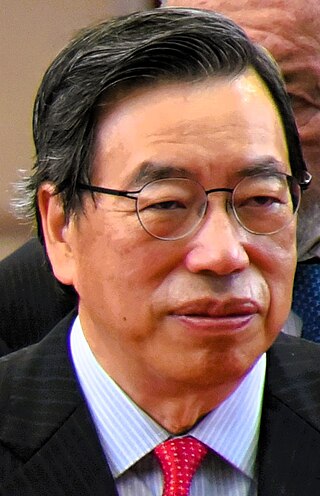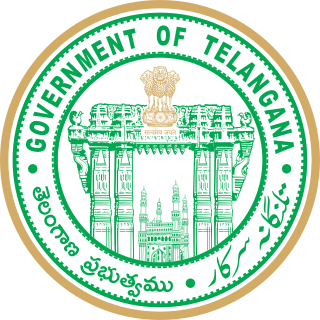Separation of powers is the division of a state's government into branches, each with separate, independent powers and responsibilities, so that the powers of one branch are not in conflict with others. The typical division into three branches of government, sometimes called the trias politica model, includes a legislature, an executive, and a judiciary. It can be contrasted with the fusion of powers in monarchies, but also parliamentary and semi-presidential systems where there can be overlap in membership and functions between different branches, especially the executive and legislative.

The Legislative Council of the Hong Kong Special Administrative Region (LegCo) is the unicameral legislature of Hong Kong. It sits under China's "one country, two systems" constitutional arrangement, and is the power centre of Hong Kong's hybrid representative democracy, though popular representation in the legislature has diminished significantly in recent years, along with its political diversity.

The Legislative Council is the upper chamber of Tynwald, the legislature of the Isle of Man. The abbreviation "LegCo" is often used.

The speaker of a deliberative assembly, especially a legislative body, is its presiding officer, or the chair. The title was first used in 1377 in England.
The Executive Yuan is the executive branch of the government of the Republic of China (Taiwan). Its leader is premier, who is appointed by the president of the Republic of China (ROC) and serves as the head of government.

The National Assembly of Quebec is the legislative body of the province of Quebec in Canada. Legislators are called MNAs. The King in Right of Quebec, represented by the lieutenant governor of Quebec, and the National Assembly compose the Legislature of Quebec, which operates in a fashion similar to those of other Westminster-style parliamentary systems. The assembly has 125 members elected first past the post from single-member districts.

The New South Wales Legislative Council, often referred to as the upper house, is one of the two chambers of the parliament of the Australian state of New South Wales. The other is the Legislative Assembly. Both sit at Parliament House in the state capital, Sydney. It is normal for legislation to be first deliberated on and passed by the Legislative Assembly before being considered by the Legislative Council, which acts in the main as a house of review.
The State Legislative Assembly, or Vidhan Sabha, also called Vidhana Sabha, or Saasana Sabha, is a legislative body in each of the states and certain union territories of India. In 22 states and 3 union territories, there is a unicameral legislature which is the sole legislative body. In 6 states, the legislative assembly is the lower house of their bicameral legislature with the upper house being the State Legislative Council. 5 union territories are governed directly by the Union Government of India and have no legislative body.

A Member of the Legislative Assembly (MLA) is a representative elected by the voters of an electoral district (constituency) to the legislature of State government in the Indian system of government. From each constituency, the people elect one representative who then becomes a member of the Legislative Assembly (MLA). Each state has between seven and nine MLAs for every Member of Parliament (MP) that it has in the Lok Sabha, the lower house of India's bicameral parliament. There are also members in three unicameral legislatures in Union Territories: the Delhi Legislative Assembly, Jammu and Kashmir Legislative Assembly and the Puducherry Legislative Assembly. Only a Member of the Legislative Assembly can work as a minister for more than 6 months. If a non-Member of the Legislative Assembly becomes a Chief Minister or a minister, he must become an MLA within 6 months to continue in the job. Only a Member of the Legislative Assembly can become the Speaker of the Legislature

The president of the Legislative Council is the presiding officer of the Legislative Council of Hong Kong. According to the Article 71 of the Hong Kong Basic Law, the president of the Legislative Council is elected by and from among Legislative Council members, plays the presiding role, administrative role and ceremonial role, and ensures the smooth conduct of the Legislative Council meetings.
In India, a governor is the constitutional head of a state of India that has similar powers and functions at the state level as those of the president of India at the central level. Governors exist in the states, while lieutenant governors and administrators exist in union territories of Delhi and Puducherry and other union territories. A governor acts as the constitutional head and takes all their decisions based on the advice of chief minister and their council of ministers.

The President of the Victorian Legislative Council, also known as the presiding officer of the council, is the presiding officer of the Victorian Legislative Council, the upper house of the Parliament of Victoria and equivalent to the President of the Australian Senate. When there is a vacancy in the office of president, a new president is elected by the members of the council from among its number. The president ceases to hold that office if they cease to be a member of the council, and can be removed at any time by a vote of the members. The current president is Shaun Leane.

The Council of Ministers is the principal executive organ of the Government of Italy. It comprises the President of the Council, all the ministers, and the Undersecretary to the Prime Minister. Deputy ministers and junior ministers are part of the government, but are not members of the Council of Ministers.

The Uttar Pradesh Legislative Council also known as Uttar Pradesh Vidhan Parishad is the upper house of the bicameral legislature of Uttar Pradesh, a state in India. Uttar Pradesh is one of the six states in India, where the state legislature is bicameral, comprising two houses: the Vidhan Sabha and the Vidhan Parishad. The Vidhan Parishad is a permanent house, consisting of 100 members.
State governments in India are the governments ruling over 28 states and 8 union territories of India and the head of the Council of Ministers in a state is the Chief Minister. Power is divided between the Union government and state governments. While the Union government handles defence, external affairs etc., the state government deals with internal security and other state issues. Income for the Union government is from customs duty, excise tax, income tax etc., while state government income comes from sales tax (VAT), stamp duty etc.; now these have been subsumed under the various components of the Goods and Services Tax
The President of the New South Wales Legislative Council is the presiding officer of the upper house of the Parliament of New South Wales, the Legislative Council. The presiding officer of the lower house is the speaker of the Legislative Assembly. The role of President has generally been a partisan office, filled by the governing party of the time. As of May 2023, the president is Ben Franklin.

The Government of Telangana also known as TelanganaGovernment, is the governing authority of the state of Telangana in India. It consists of an executive, a judiciary and a legislative.

The Delhi Legislative Assembly, also known as the Delhi Vidhan Sabha, is a unicameral legislature of the union territory of Delhi in India. Delhi Legislative Assembly is the legislative arm of the Government of Delhi. At present, it consists of 70 members, directly elected from 70 constituencies. The tenure of the Legislative Assembly is five years unless dissolved sooner.













